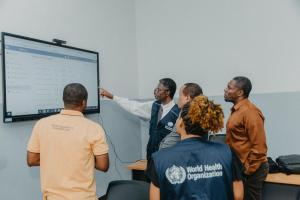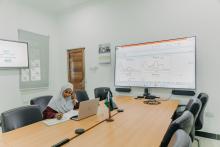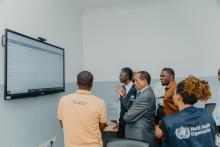Channeling a safer future for Health Response in Zanzibar
Zanzibar - The islands that make up Zanzibar in the United Republic of Tanzania evoke notions of history and deep-rooted culture, across the backdrop of a vibrant economy of spices, tourism, and fishing. The island has become gradually vulnerable to disease outbreaks and other public health concerns.
In order to ensure a safer future for all, Zanzibar has been utilizing the national surveillance and response systems for early detection to manage the spread of disease outbreaks.
To strengthen the national disease surveillance and response systems, the World Health Organization (WHO) supported the Ministry of Health in Zanzibar to adopt the third edition of the Integrated Disease Surveillance and Response (IDSR) guidelines, capacitating the community health volunteers to be able to quickly notify diseases/event at the community level to activate immediate response.
So far, WHO in collaboration with Center for Disease Control and Prevention (CDC) has supported the Ministry of Health to develop the electronic IDSR system, supported internet bundles for communication and provided training to over 300 community health care workers on reporting and verification of cases and events through the electronic system. All IDSR focal persons from public and private health facilities together with the 11-district health management team participated in the training.
According to the Abdul-wahid Al-mafazy, head of the Public Health Emergency Operation Center (PHEOC), the improved surveillance system has not only helped in responding to diseases quickly but also, it has supported the ministry in addressing health issues holistically.” In expressing his appreciation to WHO, Abdul-wahid said “We’re grateful to WHO for this timely training, thanks to them, our health workers are making efficient use of the IDSR System.”
Since 2019, Zanzibar has made significant progress in meeting the timeliness and completeness of the IDSR data that has passed the WHO of 80% or above recommendations in timeliness and completeness for the Country to use the Data for informed decision.
“The backbone of emergency response is its operational aspect. I want to commend the authorities for the good work done so far to help the people of Zanzibar. I pledge WHO’s continuous support on this journey to ensuring that surveillance is strengthened using the IDSR for us to quickly identify issues that will be responsible for any outbreak and offer a timely response,” noted Dr Charles Sagoe Moses, Country Representative of WHO.
Currently, quarterly supportive supervision and mentorship are being conducted to identify challenges and provide assistance/mentorship to the districts and IDSR focal persons for improvement on disease surveillance to ensure early identification, notification, and response to public health events.
Kauthar Abrahman Said, one of the staff at PHEOC and a beneficiary of the training revealed that, “For the love I have for my family and community, I was very happy to receive the training on operating the IDSR system from WHO. So far, we have been able to record over 2061 alerts which usually go through verification process. I must say, some disease like cholera is currently becoming a thing of the past thanks to the quick response after records.”
The Integrated Diseases Surveillance and Responses (IDSR) guideline is used by the Ministry of Health and stakeholders through the Zanzibar epidemiology and disease surveillance unit as a guiding tool that facilitates surveillance of priority diseases and serves as an early warning system for impending outbreaks that could become public health emergencies in a One Health approach.
Communications Officer
WHO Country Office, United Republic of Tanzania
Tel: +255 744377899 (Phone)
Email: adjeidum [at] who.int
Liaison Officer/PHA, Zanzibar
Email:andemichaelg [at] who.int
Mobile:+255754319916


